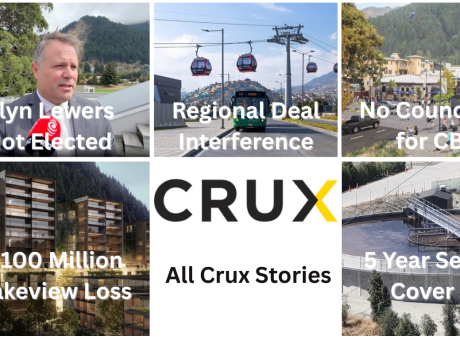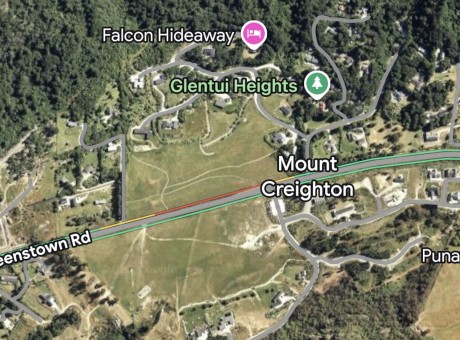QLDC releases damning survey – 80% dissatisfied with council

The Queenstown Lakes District Council has finally released details from a $30,000 ratepayer funded survey that shows 80 percent of respondents are not satisfied with the council’s performance.

Council chief executive Mike Theelen - no comment on survey results.
The same survey shows that 81 percent of respondents are not satisfied with the performance of elected councillors.
Crux was initially told the annual survey would be published on March 8, but then the QLDC’s media team said the results were being held back for a closed door “workshop” meeting scheduled for yesterday, March 23. We were then told that publication was again delayed due to "staff focus" being on yesterday's full council meeting.
Full results of the survey have now been published and it shows a further decline, the fifth year in a row, in residents’ satisfaction with the council’s performance.
QLDC chief executive Mike Theelen, who was appointed to the QLDC chief executive role in February 2016, has declined Crux requests for an interview on the survey results. Mr Theelen has received a number of salary increases and contract extensions during the same period of the ever worsening community satisfaction levels, as measured by the QLDC's own surveys.
On the question of overall council performance survey results have dropped from 43 percent satisfaction in 2018 to just 20 percent in the latest survey.

Satisfaction with all aspects of council performance has been dropping for five years.
On the question of residents feeling they have opportunity to contribute to council decisions the result has dropped from 58 percent in 2018 to 32 percent.
Satisfaction with the level of information received from the QLDC has dropped from 59 percent to 40 percent.
The QLDC survey published some comments from residents on the issue of council consultation:
“You can have your say here, but it does not appear that Council actually take account of what the community wants. It appears to just go through the motions (and the enormous cost) of consultation.”
“Council need to provide more fit for purpose consultation on important community matters. Consultation appears to currently be a tick box exercise that is not meaningful and the manner in which it is currently pursued seems to undermine confidence in council.”
“There are unrealistically short timeframes to have input. Council works on things for months and years then gives the community less than 4 weeks to read all the info and put forward an informed point of view. The process is horrible and I don’t think Council staff care.”
Another set of questions relates to how much sense of pride residents have in the district. In 2018 34 percent of residents said they had a strong sense of pride – now that number has dropped to just 17 percent.
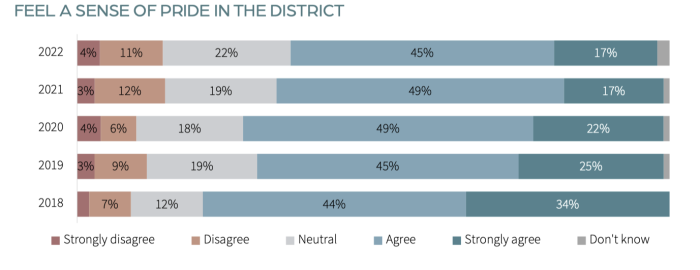
The community's sense of pride is showing a sharp decline.
The survey also documented the extremely low level of adoption of alternate modes of transport, especially when it comes to the currently heavily reduced bus services.
“When asked about regular use of alternative modes of transport, just under a third (31 percent) of residents walk daily. Further to this, seven percent of residents indicate they bike daily, six percent use an electric car daily, and four percent each use a bus or car-pool daily.”
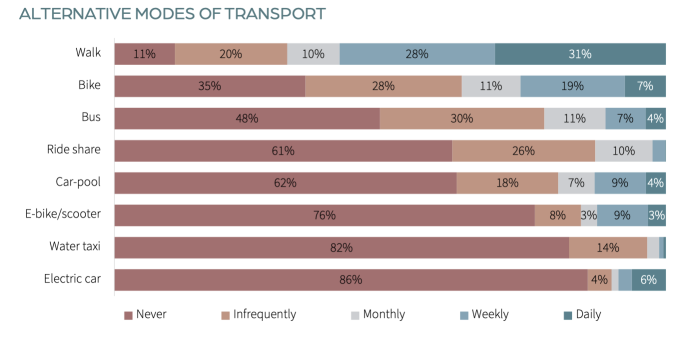
Efforts to get us out of our cars are not proving successful - with the current poor bus service being one of the main reasons.
The lack of medical services also attracted strong comments from survey respondents.
“I do not feel Queenstown is adequately served by heath care. We need a better hospital but in 21 years this has been a constant and nothing has been done about it.”
“Wānaka needs a hospital– the emergency care and injury care given at the medical centre is appalling and has very negatively affected my life in the last 48 months.”
“In Wānaka there is the potential for me to experience serious delays in accessing medical services in the event of a serious injury or illness.”
“There needs to be more specialist services available in Queenstown. Having to travel to Dunedin or Invercargill is a massive prohibitor.”
“One of my children has been on the waiting list for a pediatrician for months. When we finally got an appointment it got cancelled at short notice due to staff shortages. Specialist appointment wait times are way too long even if you’re willing to travel to Invercargill or Dunedin.”
There was also dissatisfaction with the cost of living in Queenstown.
“Jobs here don’t pay enough for the rent prices. Comparing to Auckland and other major cities were rent is comparable, salaries here are much lower.”
“We appear to have higher electricity, fuel, and food prices than a lot of other New Zealand towns, it means we have a lower disposable income than others on similar incomes.”
“The lack of awareness of pay for skill and ability is shocking. Depending on the industry you’re in the max pay as a qualified worker is $25, and that’s after 3 years of study, yet you can work in a fast food venue and get more than that...”
“I think the pay for jobs here in general is low and Queenstown needs a cost of living wage which our Council should be looking government for...”
“The local tourism and hospitality industry need to start paying a livable wage rather than the minimal wage and provide locals a fair chance at the jobs, as long term the locals will be the ones to stay. Locals aren’t applying for the jobs currently advertised due to the limited pay and past history of employment conditions.”
“My husband is a teacher and I am a nurse. Our wages do not provide enough of an income to live comfortably in Queenstown. However, Queenstown has many vacancies for both professions.”
“It’s hard to stay motivated to remain in QT as a young local builder, building homes that are destined to become expensive rental properties or second homes to out of town visitors. Whilst the wages are lackluster and are mostly going towards rent, isn’t hugely financially or socially rewarding.”
However household income data in the survey showed some improvement with almost 40 percent of those surveyed earning more than $100,000.
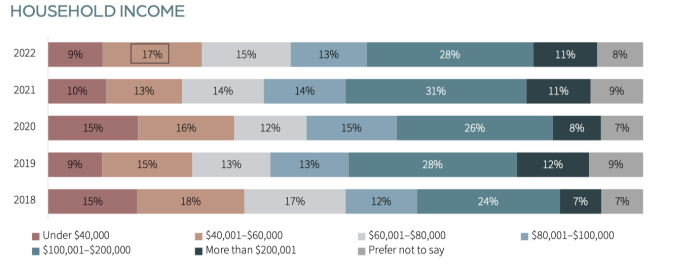
Household incomes have shown some improvement, but based on community survey comments have not kept pace with cost increases
The survey showed many respondents having had to move, often as a result of rental leases ending or poor housing quality.
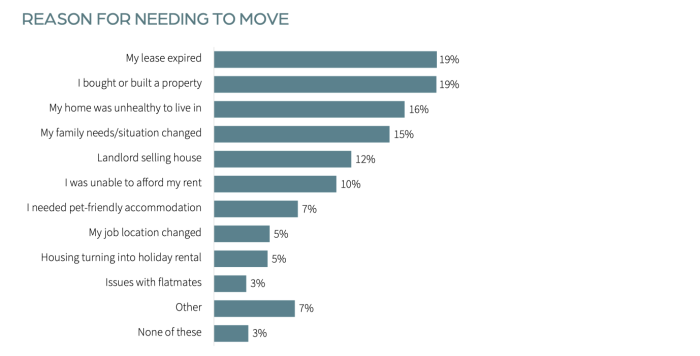
Respondents reported having to move for a variety of different reasons.
Just under 1,500 residents completed the survey.
You can access the five full annual surveys here - with the latest survey listed under "2022".
For the record, this is QLDC’s “official” summary of the full survey – in their priority order.
- 76 percent rate their quality of life as good or better.
- 19 percent of the district have lived here less than two years, and a further 19% between two and four years.
- 69 percent rated their physical health as good or very good, while 65% rated their mental health as good or very good.
- 79 percent exercised at least three times per week.
- 14 percent have a long term health condition; these residents have a lower quality of life, worse mental health, and are more likely to struggle to cover expenses.
- 40 percent rated cost as a barrier to seeing a medical professional, and 22% the length of wait.
- 62 percent indicated they would consider living in a higher-density housing option.
- 78 percent have at least some disposable income.
- 69 percent find their work fulfilling.
- 20 percent needed to move in the last 12 months, with 16 percent doing so because their home was unhealthy to live in.
- 16 percent are worried about having, and 2 percent don’t have, a steady place to live.
- Only 12 percent agreed that public transport was meeting their needs.
- 69 percent walk, and 37 percent ride their bikes, as an alternative mode of transport.
- 91 percent agree their neighbourhood is safe, while 64 percent agree that theirs is a welcoming community.
- 19 percent are satisfied with elected members, and 20 percent with council performance.
- 76 percent are concerned with the effects of climate change.
- Satisfaction with the steps QLDC is taking to protect the environment increased from 19 percent to 22 percent.
- 62 percent feel a sense of pride in the district.





